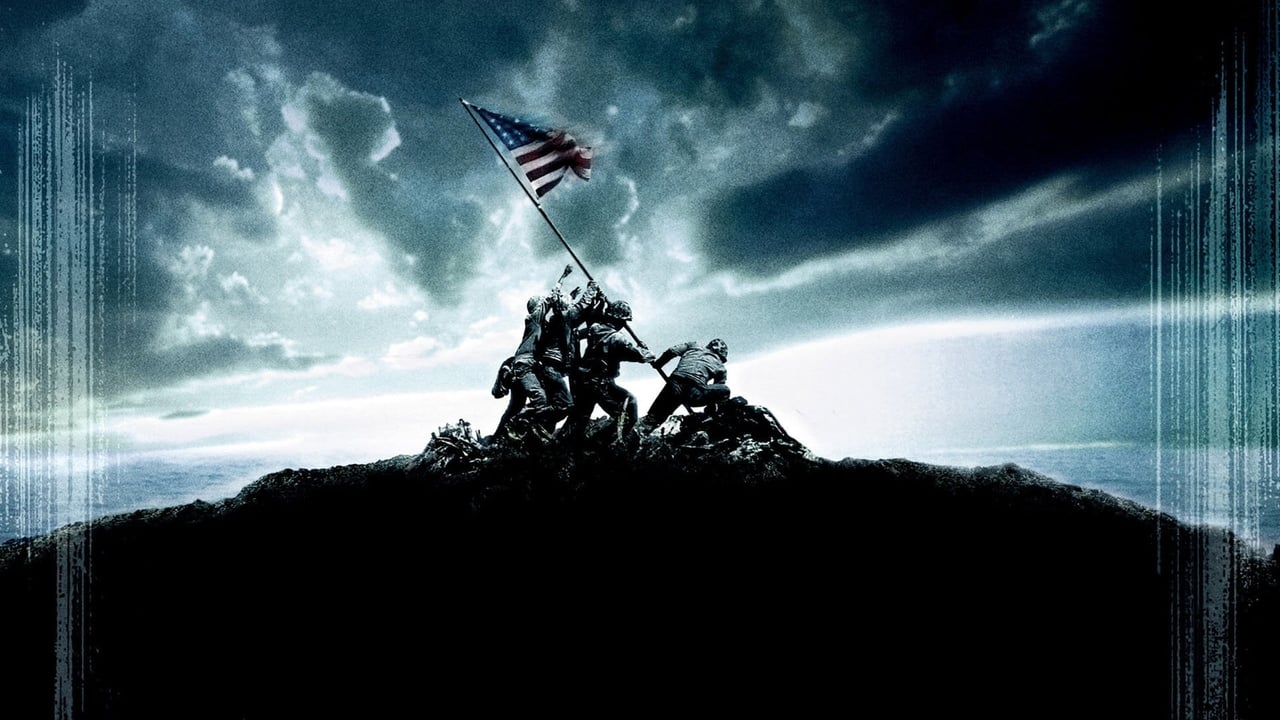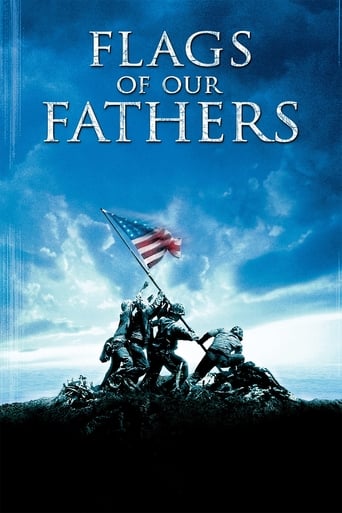Jeanskynebu
the audience applauded
Siflutter
It's easily one of the freshest, sharpest and most enjoyable films of this year.
Tyreece Hulme
One of the best movies of the year! Incredible from the beginning to the end.
Tobias Burrows
It's easily one of the freshest, sharpest and most enjoyable films of this year.
cinemajesty
Movie Review: "Flags Of Our Fathers" (2006)Film-makers Clint Eastwood and acting-producer Steven Spielberg take on a giant production for struggling label of DreamWorks Pictures LLC in season 2005/2006, nevertheless backed up by Warner Bros. Studios for first-hand distributions of this ultra-national U.S. American story on American boy soldiers, who raised a U.S. American flag on the south-bound Japanese island of "Iwo Jima" on February 23rd 1945, bringing home their tortured spirits in one of the deadliest battles in "The Pacific" most offensive efforts of the United States in World War II.Director Clint Eastwood, at age 75, coming out of his prime endeavor in directing actress Hilary Swank as female boxing champion in "Million Dollar Baby" (2004), travels onto location toward extraordinary landscapes of "Island" with fellow collaborators cinematographer Tom Stern and production designer Henry Bumstead, who are able to present some hyper-realistic, even gripping war-action scenes, which then get intercepted by editor Joel Cox's effort in post-production to make emotional sense with further leading, yet behind-expectation-character performance by actor Ryan Philippe, whose portrayal of real-life book-of-experience writing John Bradley is missing the heart-breaking edge of a splintered war-scared human spirit, when the 130-Minute-Editorial of back and forth cutting endeavors between endless "Saving Private Ryan" recalling D-day opening scene, here mainly painted grey to black, to hyped public relations in an war-victories-celebrating United States, where further media-stroke heroes, struggle throughout, as the character of Ira Hayes, performed by one-strong-scene-sharing hotelroom cry-out of getting fired actor Adam Beach, known for the more suitable portrayal of Ben Yahzee alongside Nicolas Cage in the emotionally forthcoming as fulfilling "Windtalkers" (2002) directed by John Woo."Flags Of Our Fathers" presents itself with conflicting scene work, which are skillfully capture, but at times integrate staggering computer-generated-imagery (CGI), when the picture, even with its sublime supporting cast from Barry Pepper over John Slattery, Jamie Bell and Paul Walker (1973-2013) does not want to come together to one whole war-movie-experience. But then again the two months later released brother-film "Letters From Iwo Jima" on December 20th 2006 seems to be like a silent gem in the pool of "World War II" films due to newly-receivable points of views in the South Pacific warfare of the 1940s, when the effort must have been to combine "Flags Of Our Fathers" and "Letters Of Iwo Jima" into one motion picture of a 200 Minutes including classic orchestral overture, an Intermission plus "Entr'acte" as worldwide event movie experience.© 2018 Felix Alexander Dausend
(Cinemajesty Entertainments LLC)
PWNYCNY
This is a movie that turns a story about how the government and media join together to manipulate facts for political and economic purposes into schmaltz. Everything about this movie is pure Hollywood, from the corny and hokey portrayals of the characters, reducing real-life heroes into caricatures, to the stagy acting, the phony theatrics, and the unbelievably simplistic depiction of President Roosevelt. The movie inspires not one iota of feeling of drama, including the battle scenes that are little more than computer graphics in back of a sound stage. If the intent of this movie was to make a political point, or any point, that message is at best blunted. The flag-raising scenes are glossed over, the the first one is barely mentioned, and the assertion that the US was ready to sue for peace because the country was low on funds is grotesque. The Battle of Iwo Jima is one of the iconic battles of history. The American troops demonstrated a level of valor that the movie fails to convey. True, Americans are shown being involved in battle, but these scenes are so obviously staged that they lose their dramatic impact. Over six thousand Americans died on Iwo Jima and many thousands more were injured. The Japanese garrison defending the island was practically obliterated. It is probably impossible to make a movie that can adequately rcreate the intensity of the fighting. This movie tries to do that and fails, not because they omit scenes of battle, but because the battle itself is reduced to a backdrop for a story that has to do more with politics than war. That the second flag raising got play while the first flag waving was ignored is perhaps an injustice. But to take that and make it the central theme of the story is almost sad because there was so much more that the movie could of depicted, and did not.
zkonedog
The story of the flag-raisers of Iwo Jima is a fascinating one. From the perhaps not-so-common knowledge that the picture was actually of the second flag raised on the mountain, to the misrepresentation of those even in the picture, it is a narrative filled with drama and human interest. Director Clint Eastwood is the perfect figure to tackle such a project, and he does so with his usual aplomb (aside from perhaps a few narrative structure hiccups).For a basic plot summary, "Flags Of Our Fathers" tells the story of that famous picture taken of the American flag being hoisted atop Mt. Suribachi during the battle for Iwo Jima. The film many focuses on John "Doc" Bradley (Ryan Phillippe), Rene Gagnon (Jesse Bradford), & Ira Hayes (Adam Beach), three of the flag-raisers who survived the war and were recruited by the military to tell their story and be hailed as heroes to drum up sales for war bonds. Initially, the three men seem quite uncomfortable in this role, and as the story progresses (filled with flashbacks to the Iwo Jima battle itself) we learn why: Not only was the famous picture taken of the "second flag", but there is even an error regarding which men are in the picture. The military pushes the rhetoric over the truth in order to "sell, sell, sell" those war bonds, and the three men must deal with those repercussions.First and foremost, "Flags of our Fathers" is a great movie because it has a great story to tell. Most Americans can identify that iconic flag-raising photo, but many did not know the interesting story behind it. All movies succeed/fail primarily by the strength of the story, and it is in this category where "Flags" shines the brightest. One can see their own parents or grandparents (who may have participated in WW2) through the lens of these characters, and even extrapolate upon themes of military deception or obfuscation of the truth. Fortunately, Eastwood is always very good at keeping things grounded and practical instead of "rah rah" political, so this isn't a preachy film by any means. It lays out the story and lets the viewer make their own conclusions.Supporting that fine story is some great acting all the way around. The three leads are spot-on, while the auxiliary cast features such strong performers as: John Slattery, Barry Pepper, Paul Walker, Robert Patrick, & Neil McDonough. Simply put, acting isn't a problem in this film (!).About the only reason I can't give this picture the full five stars is because of Eastwood's rather odd choice of telling the narrative in such a disjointed fashion. Parts are flashbacks, parts are narrated by a researcher interviewing the aged veterans of Iwo Jima, and even the "real time" action can jump forward or back in time with little to no warning. To me, this led to a rather disjointed experience in trying to follow the overall narrative. It seemed like every time I would get comfortable in what time/place was being presented in the scene, it would jump to another just as quick. Luckily, Eastwood is a good enough director to still "make it work", but his other films usually take a more straightforward, direct approach.Overall, though, "Flags of our Fathers" is a great film filled with wartime action, human interest, and a story that will last down through the generations. It may lack the utter gravitas of the earlier "Saving Private Ryan", but it tells an equally (if not even more) compelling story. The telling of that story may be a bit fractured, but the sum of the parts is quite a moving, emotional experience.
SnoopyStyle
In 1945, the picture of the flag raising on Mount Suribachi on Iwo Jima becomes an immediate icon. The six soldiers in the picture become instant celebrity heroes. Three of them are brought back to the states to sell Bonds. Corpsman John 'Doc' Bradley (Ryan Phillippe) continues to be haunted for the rest of his life. He and others Rene Gagnon (Jesse Bradford), Hank Hansen (Paul Walker), Mike Strank (Barry Pepper), Ira Hayes (Adam Beach) and Franklin Sousley (Joseph Cross) train together and sent into Iwo Jima. They are led by Captain Severance (Neal McDonough). Rene Gagnon tells the brass that Ira Hayes was one of the flag raiser which truly angers him and which he denies. Keyes Beech (John Benjamin Hickey) and Bud Gerber (John Slattery) push the tour selling the picture and War Bonds. There is confusion about the two flags and controversy over who the true people in the picture. It's a darker compelling telling of the battle and its aftermath. It starts moody and even the battle isn't as heroic as expected. A man falls overboard and no ship stops to save him. The battle is ugly and bloody. There is a greyness to the battle that makes it almost black and white. The confusion adds depth to the characters and the reactions add substance. The fascinating thing about this is that their odyssey doesn't end after the battle. This is also a movie about the human condition. Adam Beach is especially good in a juicy role struggling with guilt and pride.

